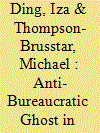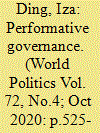| Srl | Item |
| 1 |
ID:
181928


|
|
|
|
|
| Summary/Abstract |
The Chinese Communist Party's (CCP) ideology, rooted in its foundational struggles, explicitly denounces “bureaucratism” (guanliaozhuyi) as an intrinsic ailment of bureaucracy. Yet while the revolutionary Party has blasted bureaucratism, its revolutionary regime has had to find a way to coexist with bureaucracy, which is a requisite for effective governance. An anti-bureaucratic ghost thus dwells in the machinery of China's bureaucratic state. We analyse the CCP's anti-bureaucratism through two steps. First, we perform a historical analysis of the Party's anti-bureaucratic ideology, teasing out its substance and emphasizing its roots in and departures from European Marxism and Leninism. Second, we trace both the continuity and evolution in the Party's anti-bureaucratic rhetoric, taking an interactive approach that combines close reading with computational analysis of the entire corpus of the People's Daily (1947–2020). We find striking endurance as well as subtle shifts in the substance of the CCP's anti-bureaucratic ideology. We show that bureaucratism is an umbrella term that expresses the revolutionary Party's anxiety about losing its popular legitimacy. Yet the substance of the Party's concern evolved from commandism and revisionism under Mao, to corruption and formalism during reform. The Party's ongoing critiques of bureaucratism and formalism unfold in parallel fashion with its efforts to standardize, regularize and institutionalize the state.
|
|
|
|
|
|
|
|
|
|
|
|
|
|
|
|
| 2 |
ID:
174765


|
|
|
|
|
| Summary/Abstract |
The state often struggles to meet citizens’ demands but confronts strong public pressure to do so. What does the state do when public expectations exceed its actual governing capacity? This article shows that the state can respond by engaging in performative governance—the theatrical deployment of language, symbols, and gestures to foster an impression of good governance among citizens. Performative governance should be distinguished from other types of state behavior, such as inertia, paternalism, and the substantive satisfaction of citizens’ demands. The author illustrates this concept in the realm of environmental governance in China. Given the severity of China’s environmental pollution, the resulting public outcry, and the logistical and political challenges involved in solving the problem, how can the state redeem itself? Ethnographic evidence from participant observation at a municipal environmental protection bureau reveals that when bureaucrats are confronted with the dual burdens of low state capacity and high public scrutiny, they engage in performative governance to assuage citizens’ complaints. This study draws attention to the double meaning of “performance” in political contexts, and the essential distinction between the substantive and the theatrical.
|
|
|
|
|
|
|
|
|
|
|
|
|
|
|
|